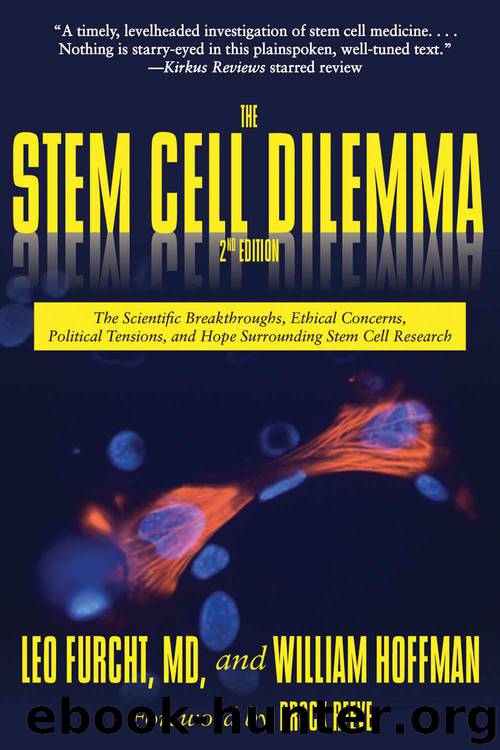The Stem Cell Dilemma: The Scientific Breakthroughs, Ethical Concerns, Political Tensions, and Hope Surrounding Stem Cell Research by Leo Furcht & William Hoffman

Author:Leo Furcht & William Hoffman [Furcht, Leo]
Language: nld
Format: azw3
Publisher: Arcade Publishing
Published: 2011-09-30T16:00:00+00:00
ARE HUMANS PATENTABLE?
In 2001, the year of Bush's first announcement on restricting stem cell research, the University of Missouri was granted a patent for a technique for cloning mammals. The university licensed the patent to Biotransplant, a leader in moving organs from one species to another—from pigs to humans, for example. Critics seized on the patent and made it an issue because the application does not exclude humans and specifically mentions human eggs. Defenders argued that the patent deals just with the process and not products. Yet the patent states that “cloned products” are covered. Critics contend that could mean embryos, fetuses, and children, though the university asserted it would not grant permission to use the patented process to clone a child. In its 1980 landmark decision on the patentability of life, Diamond v. Chakrabarty, the U.S. Supreme Court wrote that patents could be issued on “anything under the sun made by the hand of man.” The commissioner of patents and trademarks, spotting a problem with that courtly phraseology, took the liberty of putting human beings off limits as patentable in 1987.
Two years after Bush's 2001 announcement, Rick Weiss of The Washington Post reported that legislative language was being crafted for an appropriations bill that would force Congress to confront the question of whether the government should issue patents on human embryos or on the medical products developed from them. Reported Weiss:
The U.S. Patent and Trademark Office has long said it will not issue a patent on a “human being.” To do so, some argue, would violate the 13th Amendment prohibiting slavery. But the patent office has not addressed the issue of exactly when a developing embryo or fetus becomes a human being and whether its policy against patenting humans reaches back before birth.
The Thirteenth Amendment to the U.S. Constitution, passed at the end of the Civil War, overturned the Dred Scott case, in which the U.S. Supreme Court in 1857 held that one human being could hold a property right on another. Under the amendment, a human being cannot hold a property right on another. A patent is a form of a property right.
The issue of slavery and patenting human organisms found its way into the deliberations of President Bush's Council on Bioethics and into law. “Every embryo for research is someone's blood relative,” political scientist and Bioethics Council appointee Diana Schaub told an audience at the conservative American Enterprise Institute in Washington, D.C. in 2004. “Today we are forced to wonder whether mastery and slavery might assume new forms.” Yet according to a 2002 Pew Research Center survey, African Americans tend to support federal funding for stem cell research by a margin of 48 to 37 percent. An amendment to a 2005 omnibus spending bill proposed by Florida Republican and physician David Weldon barred the U.S. Patent and Trademark Office from issuing patents on human organisms, codifying into law the office's 1987 administrative decision. The biotechnology industry trade group BIO warned that Weldon's amendment contained language that would jeopardize investment and innovation due to lack of patent protection.
Download
This site does not store any files on its server. We only index and link to content provided by other sites. Please contact the content providers to delete copyright contents if any and email us, we'll remove relevant links or contents immediately.
Men In Love by Nancy Friday(5234)
Everything Happens for a Reason by Kate Bowler(4734)
The Immortal Life of Henrietta Lacks by Rebecca Skloot(4578)
Why We Sleep by Matthew Walker(4434)
The Sports Rules Book by Human Kinetics(4379)
Not a Diet Book by James Smith(3411)
The Emperor of All Maladies: A Biography of Cancer by Siddhartha Mukherjee(3148)
Sapiens and Homo Deus by Yuval Noah Harari(3068)
Day by Elie Wiesel(2781)
Angels in America by Tony Kushner(2652)
A Burst of Light by Audre Lorde(2597)
Endless Forms Most Beautiful by Sean B. Carroll(2474)
Hashimoto's Protocol by Izabella Wentz PharmD(2371)
Dirty Genes by Ben Lynch(2314)
Reservoir 13 by Jon McGregor(2300)
Wonder by R J Palacio(2204)
And the Band Played On by Randy Shilts(2198)
The Immune System Recovery Plan by Susan Blum(2057)
Stretching to Stay Young by Jessica Matthews(2037)
